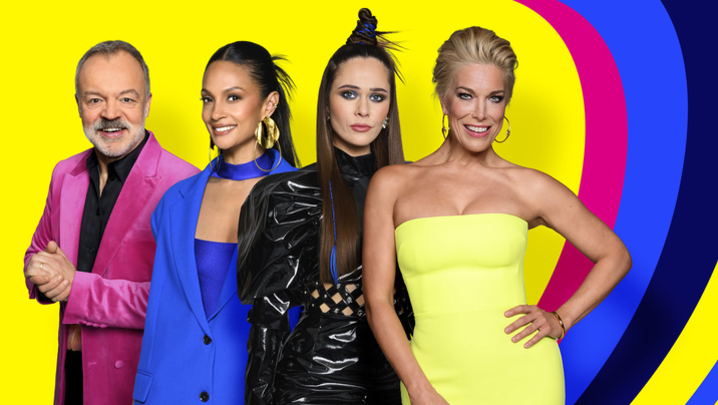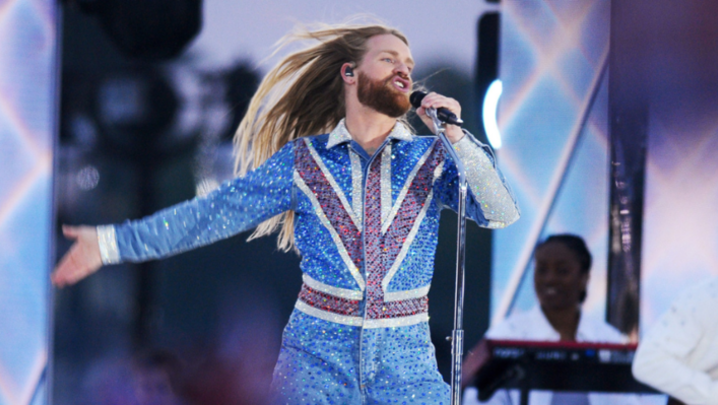Guy Freeman reports from deep inside the Eurovision bubble and hopes for greater tolerance in Ukraine.
The daily commute from hotel to venue offered us tantalising glimpses of an ancient Slavic city far bigger than I had imagined it would be. Golden onion domes, flowering chestnut trees and bustling streets framed by classical, Soviet-era and modern buildings.
Our UK delegation coach often drove past the giant metal arch adorned with this year’s Eurovision Song Contest slogan, “Celebrate diversity”, where the job of painting it in the rainbow colours of the LGBT flag had been abandoned halfway through following some resistance.
If the Eurovision contest didn’t exist, and someone tried pitching it to a commissioner today, the idea of a televised international song-writing competition involving 42 countries, featuring unknown artists and unknown hosts, made by an unknown production team, lasting three-and-a-half hours (or more) and set in a country at odds with its superpower neighbour… would never materialise. You can predict the objections: “We need A-list presenters”; “No one watches music performance shows”; “Wouldn’t it work better as a 90?”.
And, yet, this 62-year-old institution is now the most successful, live, non-sporting event in the world. The Eurovision Song Contest has a global TV reach of 200 million viewers.
In the UK, more than 7 million people watched live on BBC One until 11:30pm. Not only do journalists and fans love reacting to every twist and turn of the build-up, but as many as 70,000 tweets were sent every minute during the grand finale as viewers were, in equal measure, amazed, amused and animated.
Well over 40% of the competition’s audience was aged 16 to 34 and and we know it is far more diverse than average. By every measure, Eurovision is a huge success.
"Nothing, though, can quite prepare anyone for the intensity of the weird and wonderful Eurovision “bubble”."
You have to admire our televisionary predecessors who, back in the 1950s, against the backdrop of the Cold War, hit upon the idea. Only hindsight tells us that it was a risk worth taking. I have nothing but respect for those who believed in it at the time and were able to persuade the right decision-makers to take the plunge.
I also have huge respect for Lucie Jones, the brilliant performer of this year’s UK entry, on whose shoulders the hopes and dreams of UK Eurovision fans were resting. Having already survived a live UK selection show and having won public and jury votes, we knew that she was made of strong stuff.
Nothing, though, can quite prepare anyone for the intensity of the weird and wonderful Eurovision “bubble”. Ten consecutive days of rehearsals, press activity, semi-final broadcasts and dress rehearsals can take their toll on the faint-hearted, but Lucie handled it flawlessly. Her three minutes in the Eurospotlight of the grand finale were a tour de force that gave us huge pride and our best result in six years.
Despite the mesmerising temptations of a yodelling rap act, a man singing a duet with himself and a saxophoned earworm, ultimately, it was the simplest of songs, in the simplest of settings, that charmed the juries and public voters alike.
The success of Salvador Sobral’s Amar Pelos Dois brought an end to Portugal’s 53-year wait for Eurovision victory. Celebrations in Lisbon were no doubt under way even as we and the other delegations headed back to our hotels one last time, crossing the bridge back to the centre of Kiev – and back to reality.
Judith Gough, the British ambassador to Ukraine, was very kindly waiting to greet us at the hotel and to thank Lucie for flying the flag so successfully.
Happily, she was also able to report that there had been no problematic issues for the hundreds of British fans who’d travelled to Kiev for the week. A good result all round.
Maybe, one day, someone will be able to finish painting that rainbow.
Guy Freeman is BBC Studios’ editor, formats and special events.







